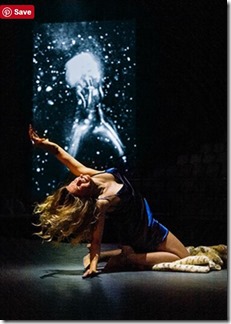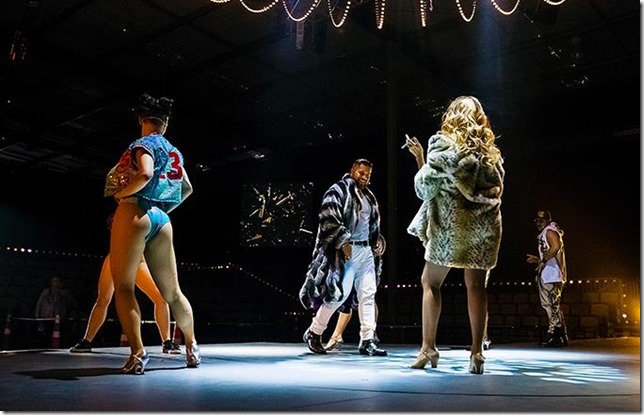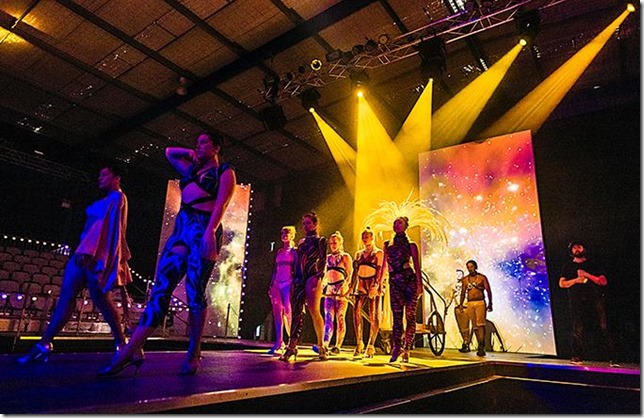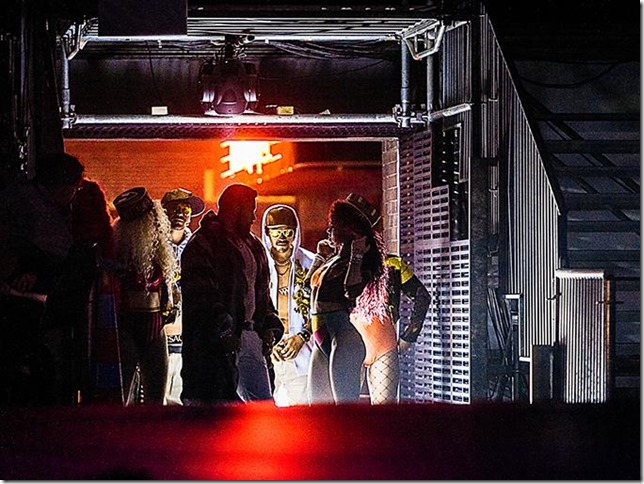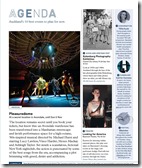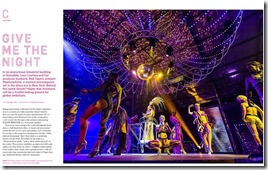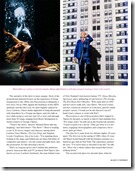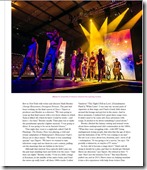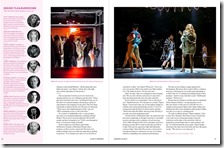The following article and images are courtesy of Paperboy, a free magazine published in New Zealand. Paperboy interviewed Rob, Michael Hurst and Charlie McDermott about Pleasuredome before the premiere.
For more about Lucy's role as Sappho in Pleasuredome Musical head on over to AUSXIP Lucy Lawless Pleasuredome subsite
Pleasuredome, a new musical extravaganza, has global ambitions
Behind The Scenes at Pleasuredome: Interview with Rob and Charlie
Give me the night
by Rosabel Tan / 28 September, 2017
In an anonymous industrial building in Avondale, Lucy Lawless and her producer husband, Rob Tapert, present Pleasuredome, a musical extravaganza set in the disco era in New York. Behind the razzle dazzle? Hopes that Auckland will be a fruitful testing ground for global ambitions.
Sitting innocuously in the heart of Avondale’s industrial zone is a warehouse with ocean-blue tinted windows that was once the home of a glass manufacturer. It’s so unassuming you’d think you were in the wrong place – if it weren’t for the sign at the entrance announcing PLEASUREDOME in a neon-pink typeface.
Even more unassuming is the scene through the front doors: a half-furnished office, so banal and unoccupied it feels like the set for a post-apocalyptic sci-fi. Currently it’s serving as the temporary headquarters for the “1980s musical destination” that’s been built in a sprawling factory out the back. Described by the team as a “Disneyland for adults” with a “dirty urban musical” at the centre, Pleasuredome combines an impressive full-scale replica of a New York city street – complete with working food vendors, bars, shops and a gaming arcade – with an arena-style stage spectacular that looks more to Vegas than any traditional theatre outlet for inspiration.
The narrative of the show is more opaque. Most of the promotional material focuses on the experience of being transported to the 1980s, but Pleasuredome is ultimately a love story. Set in 1984, against the backdrop of the AIDS epidemic and the disco era, we meet Sappho (played by Lucy Lawless), whose titular nightclub is being threatened with demolition by a Trump-ian figure, and who falls in love while trying to save her club. It’s a story told through more than 30 songs, ranging from Bruce Springsteen to Annie Lennox to George Clinton.
“There’s the show,” director Michael Hurst tells me, laughing, “and then there’s ‘The Show.’” Hurst is leading a cast of 20 actors, singers and dancers, among them Lawless, Vince Harder (The Lion King) and Stephen Lovatt (Neighbours, Top of the Lake). “I’m standing there, looking at the stage, and behind me are three full tables of computers and mixers – for the sound and light show, and the projections. It’s like directing a movie.”
That’s no surprise given who’s behind this ambitious project: American film and TV producer Rob Tapert (also known as Lucy Lawless’s husband), the man behind some of New Zealand’s best-known fantasy TV (Xena, Hercules, Spartacus) and a splattering of cult horrors (The Grudge, The Evil Dead, Don’t Breathe). “Rob came here in 1993 and he’s never really left,” says Hurst. “He loves it here, and he’s created an awful lot of work here, and he’s made people’s careers. I would not be the director I am if I hadn’t had a chance to work with Rob.”
Pleasuredome is one of those projects that’s tugged at Tapert for decades, so much so that it’s had multiple lives. “For many years,” he tells me in the boardroom upstairs, “I tried to push it as a movie.” They got close to it a few times, engaging choreographers and composers, but it never quite got there.
The idea for it came from two distinct nights, 20 years apart. The first was in the spring of 1980, when 25-year-old Tapert found himself with his business partners at a hardcore gay club in New York. The experience opened his eyes. “I’ve never been so shocked in my life,” he tells me. “Here was a whole culture that existed that I knew nothing about.”
The second took place two decades later, when he flew to New York with writer and director Mark Beesley (Savage Honeymoon, Outrageous Fortune). The pair had been working on the final season of Xena – Tapert as producer and Beesley as a director. “We were going to wrap up that final season with a two-hour climax in which Xena is killed off, which he knew would be tricky – and heavy – for fans,” Beesley recalls. Their plan was to make the penultimate episode a lighter musical. “I was going to direct. It was going to be set in Ancient Greece.”
That night they went to a nightclub called Club El Flamingo. The Donkey Show was playing, a wild and sweaty adaptation of Shakespeare’s Midsummer Night’s Dream set to disco music. “We knew it was something special,” says Tapert. “We knew we wanted to take infectious songs and use them in a new context, pulling out the meanings that are hidden in the lyrics.”
Although that musical Xena episode didn’t pan out, the pair kept emailing back and forth over the years. “And then one night,” Beesley recalls, “I was in a little cottage at Karekare, in the middle of the native bush, and I had the stereo up really loud – all these 1980s tracks: Luther Vandross’ ‘The Night I Fell in Love’, [Grandmaster Flash’s] ‘White Lines’. I was onto my second pack of cigarettes at that stage, and I had a lonely little dance around the lounge and got lost in the music. And in those moments, I realised how great these songs were. It didn’t need to be some sub-Xena adventure with songs. It needed to be about something I cared about.”
Beesley ditched the fantasy setting and instead wrote about those underground club communities in the 1980s. “What they were struggling with – with HIV being undiagnosed, losing people, that idea that the age of disco and the hedonism of the 1970s was coming to an end.” He saw it as a story about loss, freedom, and – most of all – redemption. “It was going to be a movie,” he says. “Or possibly a telemovie, or maybe a TV series.”
So how did it become a stage show? “Mark said all along it should be a play, and that we should get Michael Hurst [as director],” says Tapert. He refused at first. “I said: ‘that’s not the business I’m in.’” But then Beesley pulled out, and in 2013, Hurst came on, helping translate it into a live experience with help from writers Dan Musgrove and Gareth Williams. “All the things that have fallen into place,” says Tapert, “tell me this is the right time and the right place for this project.”
The second time I visit the set, it’s two weeks from opening and the crew are working around the clock. “These guys have been here since 1am,” says Romola Lang, one of the show’s two general managers, gesturing at a group of men in fluoro vests banging on some poles. They’ll be there until lunch, at which point the cast will arrive for rehearsals. “That’s one of the complicated parts of this,” she says. “We’re creating the venue as well as the show.”
It’s a project of unthinkable scale – a step up from that other west Auckland millionaire’s offering at Woah! Studios. Pleasuredome’s pop-up nightclub will seat 800 people, and they’re hoping to see 70,000 come through its doors over the next couple of months.
In the boardroom, I ask Tapert and Charlie McDermott (founder of Basement Theatre and a producer on Pleasuredome) about risk. The show isn’t publicly funded, and even at this late stage they’re pulling in sponsors. “I’ve violated every rule I’ve ever lived by as a producer on this,” says Tapert. Which are? “Never use your own money. That’s rule number one. Rule number two?” He shakes his head. “It’s the same rule.”
“But,” he adds, “this was something we had to plunge into.” He says this with the conviction of a man who’s been dreaming about this show his entire adult life.
So how much is it costing them? “Are we allowed to say?” McDermott asks. “It would give no context,” Tapert shrugs. “Let me put it this way: it’s the highest budget for a theatre show generated from this country.” I ask if it’s costing more than the Pop-Up Globe and he chuckles. “Much more than the Globe. And more than Matilda, if you take away their marketing spend.”
“On the Globe,” McDermott adds – he speaks fast and loud and evangelically, as though everybody is a potential investor, drawing on the vocabulary of tech start-ups. “I love Miles [Gregory]. He’s been a disrupter, and I love disruptive people. But I would say this: they got half of it right. They got the experience right. But ultimately, content is king.” And while Pleasuredome is focussed on creating an immersive experience, he says, it’s nowhere without a compelling story and great performances.
The pair are also taking a unique approach to development. Broadway shows tend to follow a common trajectory, rehearsing for six months and performing in a small venue for 12, refining and refining ahead of their premiere. “And we went, well, that’s crazy.” McDermott exclaims. “We live here.”
Instead, they’re hoping to run this season in Auckland before taking it offshore – recognising that even if they lose money on this season, it will still serve as a valuable testing ground. Tapert calls it their calling card. McDermott calls it their minimum viable product. Either way, they see it only as a starting point.
“In order to fulfil its destiny,” Tapert explains, “it has to leave New Zealand.” But before it does, it heads into a six-week season, in that unassuming converted warehouse on the edge of the motorway, with one particularly special feature that no other audience will get. “I would not build the street again,” Tapert laughs, referring to the diner, the food trucks, the bars, the games arcade. “The street is a very lucky get.”
Links: Paperboy Onlin
For more about Lucy's role as Sappho in Pleasuredome Musical head on over to AUSXIP Lucy Lawless Pleasuredome subsite
